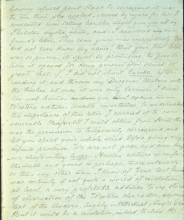Страница 7
having refused point blank to correspond, it was to me that she applied. Moved by regard for her, I consented even telling her she might give you all my Thibetan mystic name, and — I answered our friend's letter. Then came yours — as unexpectedly. You did not even know my name! But your first letter was so sincere, its spirit so promising, the possibilities it opened for doing general good seemed so great, that if, I did not shout Eureka after reading it, and thrown my Diogenes' lantern into the bushes at once, it was only because I knew too well human and — you must excuse me — Western nature. Unable, nevertheless, to undervalue the importance of this letter I carried it to our venerable Chief. All I could obtain from Him, though, was the permission to temporarily correspond, and let you speak your whole mind, before giving any definite promise. We are not gods, and even they, our chiefs — they hope. Human nature is unfathomable, and yours is perhaps, more intensely so than any other man I know of. Your last favour was certainly if not quite a world of revelation, at least, a very profitable addition to my store of observation of the Western character, especially that of the modern, highly intellectual Anglo-Saxon. But it would be a revelation, indeed, to Mad. B.



Eureka means "I have found it," supposedly exclaimed by the ancient Greek Archimedes when he discovered principle of using displacement of water to determine the volume of an irregular object.
Diogenes' lantern refers to Diogenes of Sinope, who walked the streets of Athens carrying a lantern in broad daylight, searching for an honest man.